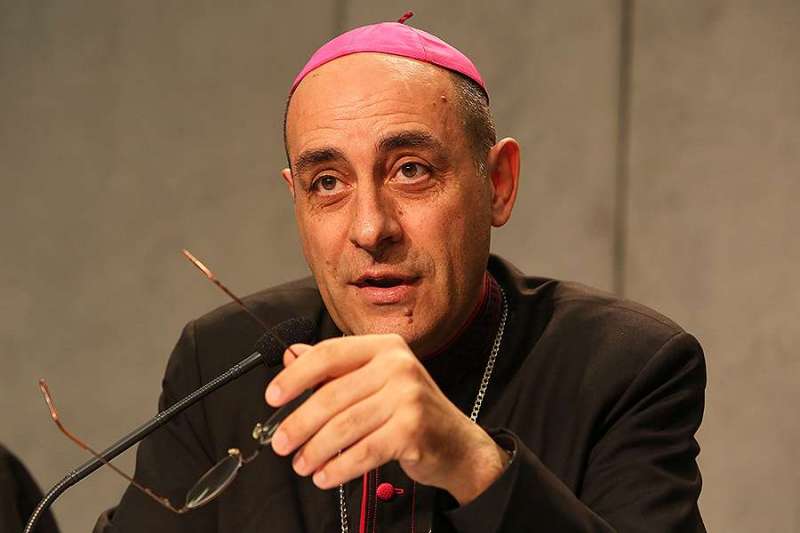Pope Francis has appointed his personal theologian and ghostwriter Archbishop Victor Manuel Fernandez to head the Argentinian Archdiocese of La Plata, the Holy See’s press office announced Saturday.
Fernandez, 55, replaces Archbishop Héctor Aguer, who turned 75 in May, the age at which diocesan bishops are required to submit letters of resignation to the pope.
Fernandez was replaced as rector of the Pontifical Catholic University of Argentina in April after serving in the position since 2011, and university officials told CNA at the time Fernandez was hoping to be named Archbishop of La Plata, considered to be the second most important Argentinian archdiocese, after Buenos Aires.
The archbishop is a controversial figure in the Church in Argentina, because of some of the publications of his past, and because of his open claim that he can interpret Pope Francis at almost every turn, CNA’s executive director Alejandro Bermudez said in an April 2018 analysis for Catholic News Agency.
Fernandez was born in 1962 in the small rural town of Alcira, in the Province of Córdoba. He was ordained a priest in August 1986 in Río Cuarto, a mostly rural diocese. In 1988 he obtained a degree in theology with a biblical specialization at the Pontifical Gregorian University in Rome, and then obtained a doctorate in theology at the UCA in 1990.
With the recommendation of then-Archbishop Jorge Bergoglio, in the early 90s he moved to Buenos Aires, where he was appointed a consultor to several commissions within the Argentinean bishops’ conference and the Latin American Bishops Council (CELAM).
Having shown a great capacity for writing, Cardinal Bergoglio brought Fernandez as an expert to the Fifth General Conference of the Latin American Bishops, held in 2007 at the Brazilian Marian shrine of Aparecida. It is said that Cardinal Bergoglio, head of the drafting committee of the General Conference, relied heavily on Fernandez’ ability to synthesize a diverse set of viewpoints in his writing, according to Bermudez.
Aparecida, many sources have claimed, solidified the relationship between the future Pope and the theologian.
On December 15, 2009, Cardinal Bergoglio appointed Fernandez as rector of the Pontifical Catholic University of Argentina. However, much to the frustration of Cardinal Bergoglio, Fernandez was not able to take the oath of office until May 20, 2011, after he had answered objections to his appointment raised by the Congregation for the Doctrine of the Faith, which assessed concerns about the orthodoxy of certain elements of his scholarship.
An avid writer, by the time Fernandez was chosen by Cardinal Bergoglio as the UCA rector, he had written more than 100 articles and books, including, “Incarnated Spiritual Theology” (2004), a book that was featured in the Argentinean soap opera “Esperanza Mía,” about an illicit love affair between a priest and a nun.
The book commonly regarded as his most unusual is the 1995 work “Heal me With Your Mouth: The Art of Kissing.” Regarding the book, Fernandez explained that: “in these pages I want to synthesize the popular feeling, what people feel when they think of a kiss, what they experience when they kiss... So, trying to synthesize the immense richness of life, these pages emerged in favor of kissing. I hope that they help you kiss better, that they motivate you to release the best of yourself in a kiss.”
The book has disappeared from most official lists of Fernandez’ works.
Pope Francis appointed Fernandez the titular Archbishop of Tiburnia on May 13, 2013, thus making him the first rector of UCA to become an archbishop.
The pope also entrusted Fernandez with drafting his first apostolic exhortation, “Evangelii Gaudium,” a text in which the archbishop cited his own prior scholarship as a source document.
Pope Francis later appointed him vice-president of the commission for the message of the Extraordinary Synod of Bishops on the Family, held in October 2014, and later appointed him a member of the pontifical roster of the Fourteenth Ordinary General Assembly of the Synod of Bishops on the Family in October 2015. He was then nominated by the Pope for the commission for the elaboration of the synod’s final report.
He was also involved in the drafting of “Amoris Laetitia,” coming under criticism for drawing heavily on his own writings throughout the document, Bermudez said.

